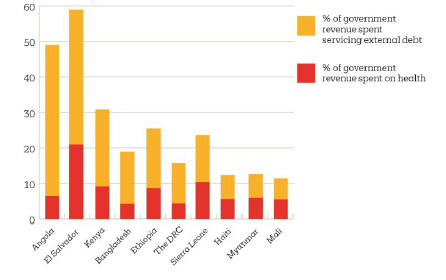The Covid-19 pandemic has deepened global inequalities and could lead to ‘catastrophe’ if not addressed through a recovery plan, according to a new report by Christian Aid.
Increases in unemployment, food insecurity and disruption to healthcare are compounding the crisis.
The Building Back with Justice: Dismantling Inequalities after Covid-19 report says: “Without immediate and decisive action, a crisis in the poorest countries threatens to escalate into a catastrophe that will cause untold human suffering, entrench inequalities and slow any recovery.”
Christian Aid has criticised richer countries in the global north for failing to relieve the debt burden on countries in the global south. Many were already crippled with debt before the start of the pandemic, including 64 low and lower-middle income countries who were spending more on debt repayments than on healthcare.
Comparing debt servicing and health spending in selected countries

The report shows how richer countries have mobilised large sums of money to support their economies compared to those burdened with debt. Germany and Italy have spent over 30% of GDP on economic stabilisation, while Malawi, Kenya and DRC have spent less than 1%.
Although debt repayments are currently suspended until the end of this year, Christian Aid is calling for a complete 12 month cancellation of debt for 76 low-income countries. It says debt cancellation, “could be one of the fastest ways to free up resources for some of the countries worst affected by the pandemic and its economic impacts”.
The charity also wants to see tax reform that addresses tax abuses, and introduces wealth taxes to release resources. In India, a wealth tax on the ultra-rich would raise just over 1% of GDP and enable the government to double its health budget.
Without urgent action, acute hunger could increase dramatically in 2020. Afghanistan is already seeing a 20% rise in wheat prices, according to the report.
In India, around 80 million migrant workers – many of whom are from Dalit and marginalised backgrounds – have lost their jobs in the cities and been forced to return to rural areas without any obvious means of support.
And severe disruption to routine healthcare, such as immunisation and maternity care, “could cause more deaths than the virus itself,” the report says.
Adequate sanitation to prevent the spread of Covid-19 is also more challenging in many countries. The report says that 40% of the global population do not have access to basic hand-washing facilities at home.
90% of children have lost part of their education during lockdown and many are at risk of never returning, especially girls. “The experience of the Ebola epidemic in west Africa shows that school closures have led to a higher level of girls leaving school permanently, and to increases in child labour, neglect, sexual abuse, teenage pregnancies and young marriages.”
The charity calls for a co-ordinated global response to the pandemic by combining resources in research, patents and technology – so all countries are equipped to tackle Covid-19. So far the response has been, “characterised more by competition than by collaboration”, it says.
Recovery must be green and sustainable, according to the report. As investment in green energy technologies has become less expensive in the last decade, the move towards a low-carbon economy is closer. “The aim must be to decouple growth from greenhouse gas emissions, and to halve global emissions by 2030 and be carbon free by 2050″, the report says.
In a forward to the report, leading development economist Jayati Ghosh says to prevent catastrophe we need greater levels of vision and ambition “to enable a broad-based and equitable global recovery that radically transforms our economic and social relations, and puts people and planet at its centre.”
Main image: Christian Aid/Jerry Clinton
Related Posts
June 18, 2020
Spoken Stories: Experiences of growing up mixed race in the south west of England
I recently came across this excellent…



